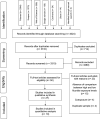A systematic review and meta-analysis of the association between fluoride exposure and neurological disorders
- PMID: 34811523
- PMCID: PMC8609002
- DOI: 10.1038/s41598-021-99688-w
A systematic review and meta-analysis of the association between fluoride exposure and neurological disorders
Abstract
Different studies have suggested that fluoride is related to neurological disorders in children and adolescents, but clinical evidences of which neurological parameters associated to fluoride exposure are, in fact, still controversial. In this way, this systematic review and meta-analysis aimed to show if there is an association between fluoride exposure from different sources, doses and neurological disorders. Terms related to "Humans"; "Central nervous system"; "Fluorides"; and "Neurologic manifestations" were searched in a systematic way on PubMed, Scopus, Web of Science, Lilacs, Cochrane and Google Scholar. All studies performed on humans exposed to fluoride were included on the final assessment. A meta-analysis was then performed and the quality level of evidence was performed using the GRADE approach. Our search retrieved 4,024 studies, among which 27 fulfilled the eligibility criteria. The main source of fluoride was naturally fluoridated water. Twenty-six studies showed alterations related to Intelligence Quotient (IQ) while only one has evaluated headache, insomnia, lethargy, polydipsia and polyuria. Ten studies were included on the meta-analysis, which showed IQ impairment only for individuals under high fluoride exposure considering the World Health Organization criteria, without evidences of association between low levels and any neurological disorder. However, the high heterogeneity observed compromise the final conclusions obtained by the quantitative analyses regarding such high levels. Furthermore, this association was classified as very low-level evidence. At this time, the current evidence does not allow us to state that fluoride is associated with neurological damage, indicating the need for new epidemiological studies that could provide further evidences regarding this possible association.
© 2021. The Author(s).
Conflict of interest statement
The authors declare no competing interests.
Figures



References
-
- Ten Cate JM, Buzalaf MAR. Fluoride mode of action: Once there was an observant dentist. J. Dent. Res. 2019;98(7):725–730. - PubMed
-
- Pessan JP, Toumba KJ, Buzalaf MAR. Topical use of fluorides for caries control. Monogr. Oral Sci. 2011;22:115–132. - PubMed
-
- Whitford GM. Acute toxicity of ingested fluoride. Monogr. Oral Sci. 2011;22:66–80. - PubMed
Publication types
MeSH terms
Substances
LinkOut - more resources
Full Text Sources
Medical

